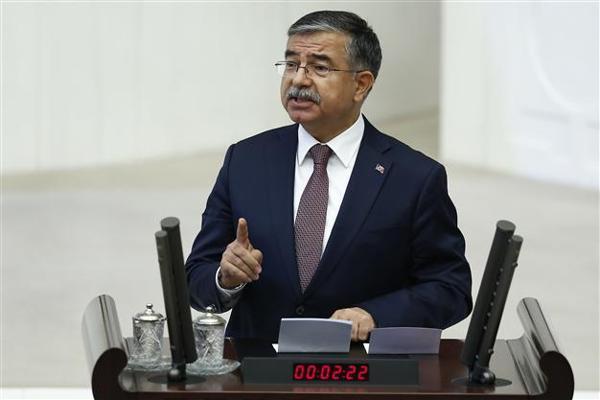AKP candidate elected as Turkey's parliament speaker
ANKARA


CİHAN photo
Turkish Defense Minister İsmet Yılmaz of the Justice and Development Party (AKP) was elected the country’s new parliamentary speaker in the fourth round and with the covert support of the Nationalist Movement Party (MHP) on July 1 in a sign of possible coming coalition between the two.“Our nation has been expecting a new constitution soon from the 25th term of parliament. The economic and democratic level that our country has reached today makes a new constitution an obligation for all of us,” Yılmaz said in his first remarks delivered in parliament after being elected to his new post.
The AKP group provided full support to its candidate in both the third and fourth rounds, but the victory came thanks to the MHP’s decision not to vote for Baykal. The support of the CHP group as well as around 50 votes from the Peace and Democracy Party (BDP) was insufficient to elect Baykal, the temporary speaker of the parliament, for the country’s number two place in the state protocol.
The MHP’s indirect support to the AKP’s candidate drew fierce criticisms from both the CHP and the HDP, which accused the nationalist party of acting like the crutch of the ruling party. The two opposition party executives also implied that such a composition revealed the potential partners of a coalition government.
CHP, HDP angry at MHP
“The result has been presented to the AKP on a golden plate by the leader of a party,” said Haluk Koç, spokesperson for the CHP.
Extending congratulations to Yılmaz, Koç said he expected that the new parliamentary speaker’s conduct would be “in line with rules of democracy,” unlike the previous parliamentary speaker.
“Some debates took place after the election. This manner shows that the message given by people on June 7 could not been interpreted. Narrow-sighted and cowardly politics will not resolve problems,” Koç said. “Partners for the coalition showed up.”
HDP co-chair Selahattin Demirtaş echoed Koç’s summation of the MHP’s stance and the results. “One more time, there is a speaker who has been elected by a single party’s votes. I wish the opposition could accomplish this, but the MHP has presented the seat of the parliament speaker as a gift to the AKP. I say ‘congratulations’ to the MHP,” Demirtaş said in bitter remarks.
Demirtaş went further by describing a potential partnership in forming a government between the AKP and MHP as a “war coalition” because of their similar rhetoric and lines over the developments in Syria. The HDP’s co-leader said the HDP would perform its duty to oppose the match.
PM: No more blocs
Prime Minister Ahmet Davutoğlu, however, dismissed the opposition’s claims that parliamentary speaker’s election was a sign of a coalition between the AKP and the MHP, saying, “This election has nothing to do with coalition scenarios.”
“Everything took place in legitimacy. There was not even a tiny discussion while some tensions were obviously expected,” Davutoğlu said, praising acting Parliamentary Speaker Deniz Baykal, the CHP’s candidate for the post, for his conduct of the voting sessions.
“I suppose this picture has displayed how some approaches floated in recent days are invalid, such as ‘the bloc,’” Davutoğlu said, referring to the phrase “60 percent bloc” which was coined by CHP leader Kemal Kılıçdaroğlu.
With the phrase, Kılıçdaroğlu pointed to the total number of votes garnered by his party combined with those of the MHP and the HDP in the June 7 election. The AKP received around 41 percent of the total, but failed to secure a majority in the 550-seat parliament required to rule alone.
“As of today, the concept of a bloc in politics has collapsed,” Davutoğlu said, offering gratitude to “each deputy who contributed” to this situation in regard to the idea of “a bloc.”
Coalition talks looming
“Nobody should resort to tactics and intrigues and let everything take place transparently before the public,” Davutoğlu said, referring to the upcoming process of negotiations for forming a coalition.
Noting that he will be holding talks with all three parties, Davutoğlu said their priorities and stance have been clear.
“For us, the parliamentary speaker election is not the same as the coalition process. If I would have said that this is a signal, then I would have opposed what I have earlier alluded to. However, today’s environment has actually offered opportunities for an assessment of different coalition options,” he said.
Who is İsmet Yılmaz?
Yılmaz studied at the World Maritime University in Sweden where he was granted an MSc on “Technical Management of Shipping Companies” and an MA from Marmara University’s Institute of Social Sciences. Yılmaz also holds a PhD in private law from Ankara University’s Institute of Social Sciences.
Yılmaz was elected to parliament for the first time in the June 2011 election as a deputy representing his hometown of Sivas. He was appointed as defense minister of the 61st Turkish government in July 2011.
